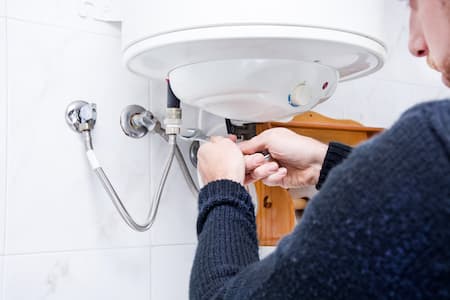Overcoming Regular Water Heater Issues
Overcoming Regular Water Heater Issues
Blog Article
This post below in relation to Common Problems with Tank Water Heaters is fairly motivating. Check it out for yourself and see what you think about it.

Picture starting your day without your routine hot shower. That currently establishes a bad tone for the remainder of your day.
Every residence requires a reputable water heater, but just a couple of recognize how to take care of one. One simple way to maintain your water heater in top shape is to check for mistakes on a regular basis and also repair them as quickly as they show up.
Keep in mind to turn off your water heater before smelling about for faults. These are the water heater faults you are more than likely to come across.
Water as well hot or as well cool
Every hot water heater has a thermostat that establishes how hot the water gets. If the water coming into your residence is too hot regardless of establishing a hassle-free maximum temperature level, your thermostat could be damaged.
On the other hand, too cold water may result from a fallen short thermostat, a damaged circuit, or improper gas circulation. For instance, if you make use of a gas hot water heater with a damaged pilot light, you would get cold water, even if the thermostat remains in perfect condition. For electric heating units, a blown fuse may be the wrongdoer.
Not enough hot water
Hot water heater been available in several sizes, relying on your hot water demands. If you lack warm water prior to everyone has had a bath, your water heater is as well little for your family size. You should take into consideration installing a larger water heater storage tank or selecting a tankless hot water heater, which occupies much less area and is more durable.
Strange noises
There go to the very least five kinds of noises you can speak with a hot water heater, but the most usual analysis is that it's time for the hot water heater to retire.
First of all, you ought to be familiar with the normal sounds a water heater makes. An electric heating unit may sound different from a gas-powered one.
Popping or banging noises generally imply there is a piece of debris in your containers, and also it's time to clean it out. On the other hand, whistling or hissing sounds may simply be your shutoffs letting some pressure off.
Water leakages
Leakages can originate from pipelines, water connections, valves, or in the worst-case situation, the tank itself. Gradually, water will certainly corrode the tank, and also locate its escape. If this takes place, you require to change your hot water heater as soon as possible.
Nonetheless, prior to your change your entire tank, be sure that all pipelines are in location which each valve works perfectly. If you still need assistance recognizing a leak, call your plumber.
Rust-colored water
Rust-colored water suggests among your water heater components is worn away. It could be the anode rod, or the container itself. Your plumber will have the ability to determine which it is.
Warm water
No matter exactly how high you established the thermostat, you will not get any type of warm water out of a heater well past its prime. A water heater's effectiveness might reduce with time.
You will certainly also obtain lukewarm water if your pipelines have a cross connection. This implies that when you turn on a faucet, hot water from the heater flows in alongside regular, cold water. A cross link is easy to spot. If your warm water faucets still pursue shutting the water heater shutoffs, you have a cross link.
Discoloured Water
Corrosion is a major root cause of dirty or discoloured water. Deterioration within the water container or a failing anode pole can create this discolouration. The anode pole protects the storage tank from rusting on the within and also must be examined yearly. Without a pole or a properly working anode pole, the warm water promptly rusts inside the container. Contact a specialist water heater service technician to identify if changing the anode rod will fix the trouble; otherwise, change your hot water heater.
Final thought
Ideally, your water heater can last one decade before you require a change. However, after the 10-year mark, you may experience any of these faults extra on a regular basis. At this point, you must add a new hot water heater to your spending plan.
How To Troubleshoot 3 Common Water Heater Problems in Twin Cities
The Water Heater Is Leaking
A leaky cold water inlet valve A loose pipe fitting A leaky temperature and pressure relief valve A corroded anode rod A cracked tank Turn Off Your Water Heater:
Shut off your gas water heater by turning the gas valve on the unit to the “OFF” position. Shut off your electric water by switching its power off at your electrical panel. Look for a two-pole breaker labeled “water heater” and turn it to the “OFF” position. Move the ball valve connected to the water heater to be perpendicular to the piping at a 90° angle. Look for the Leak:
Depending on whether the water is coming from the tank's top or bottom, you’ll want to look for the leak in different locations.
If the leak comes from the top of the tank, carefully look for water escaping from the cold water inlet valve or loose pipe fittings. Rusted hot and cold water valves can have loose connections with the tank, with water leaking out of them.
https://mspplumbingheatingair.com/blog/how-to-troubleshoot-3-common-water-heater-problems
As a serious reader on Common Problems with Your Home Water Heater, I was thinking sharing that excerpt was really helpful. Sharing is good. One never knows, you might be helping someone out. We enjoy reading our article about Water Heater Repair and Troubleshooting.
Plumber on standby. Call! Report this page